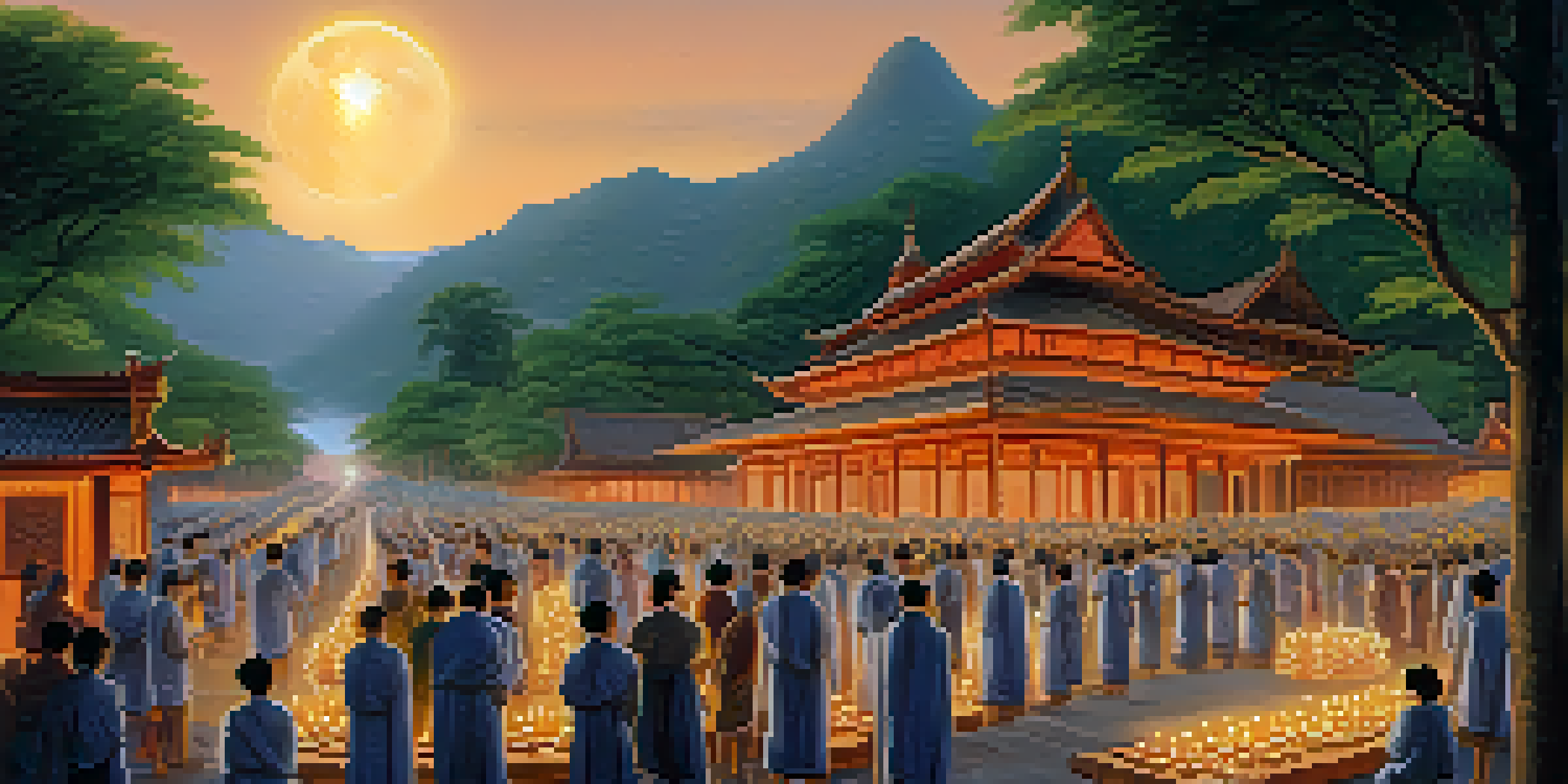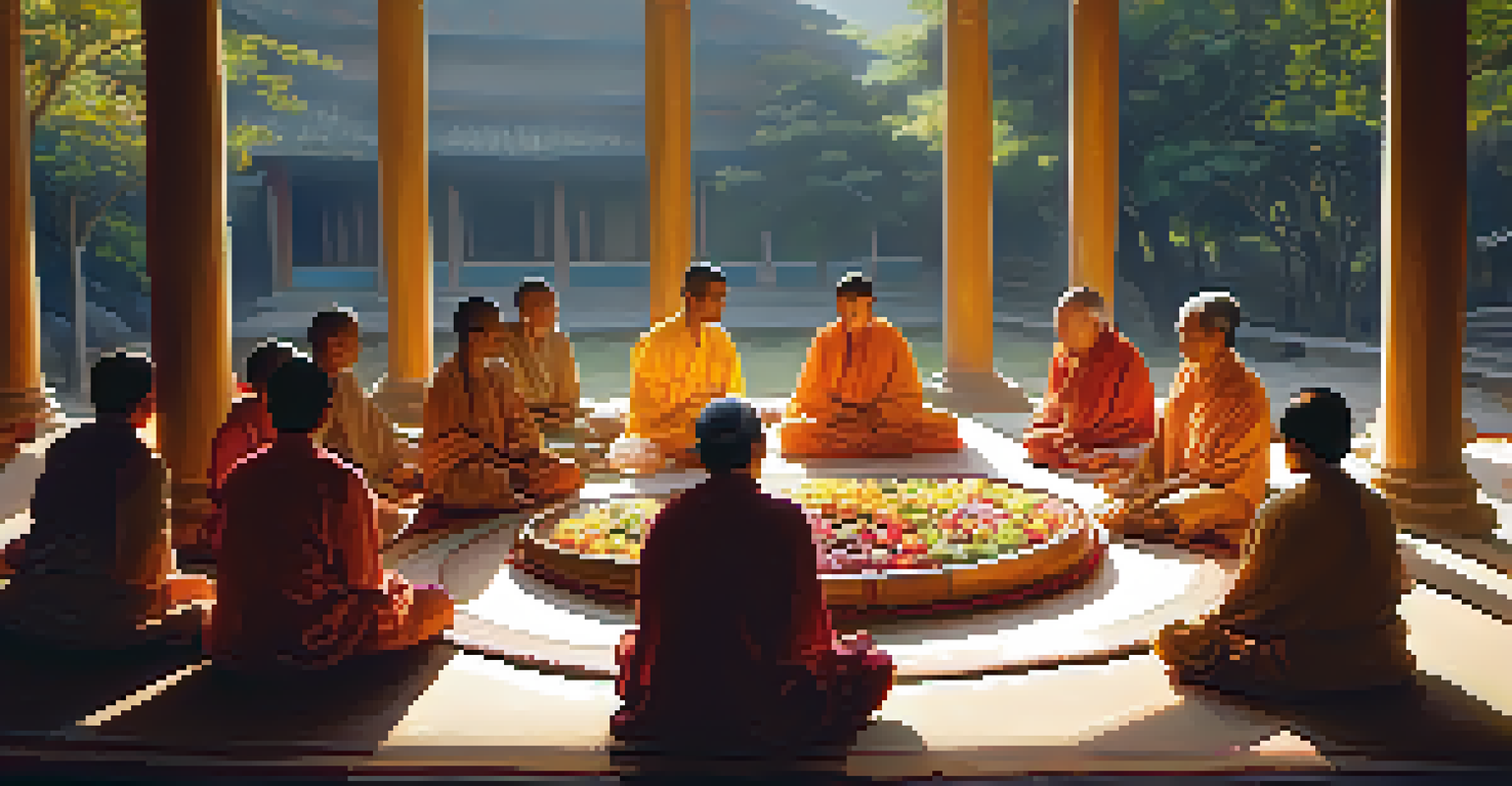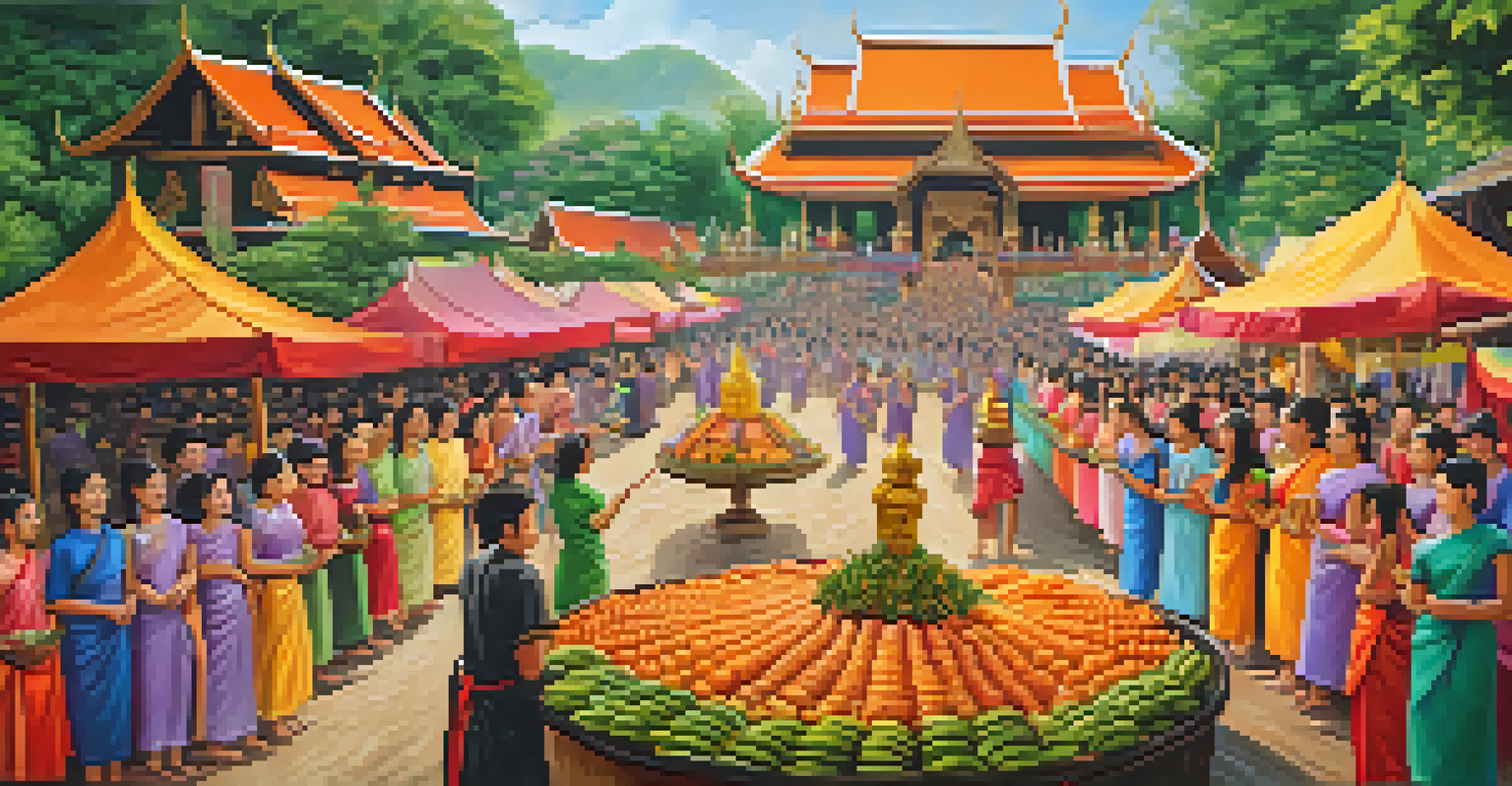Makha Bucha: A Day of Reflection in Buddhist Thailand

What is Makha Bucha and its Importance in Buddhism?
Makha Bucha is a significant Buddhist holiday celebrated in Thailand, marking the day when the Buddha delivered a profound sermon to his first 1,250 disciples. This event is not just a historical moment; it symbolizes the essence of Buddhism and the teachings that guide practitioners. The day serves as a reminder of the core principles of the faith, including morality and mindfulness.
The mind is everything. What you think you become.
Observed on the full moon of the third lunar month, Makha Bucha encourages practitioners to reflect on their actions and intentions. It’s a time for both personal and communal reflection, allowing Buddhists to reconnect with their spiritual paths. The importance of this day goes beyond rituals; it’s about fostering a deeper understanding of one's beliefs and practices.
In Thailand, this holiday is marked by various ceremonies, including candlelit processions and offerings at local temples. These activities help reinforce the teachings of the Buddha, drawing participants into a shared spiritual experience. Ultimately, Makha Bucha serves as a vital touchstone for Thai Buddhists, connecting them to their faith and to one another.
Traditional Practices During Makha Bucha
During Makha Bucha, many Thais engage in age-old traditions that bring the community together. One of the most notable practices is the candlelit procession around the temple, known as 'Wien Tien.' Participants carry candles, incense, and flowers, symbolizing their respect and devotion towards the Buddha and his teachings.

In addition to the procession, many devotees spend the day meditating and listening to sermons delivered by monks. This practice not only fosters a sense of peace but also allows individuals to absorb the teachings of Buddhism on a deeper level. It’s a chance for reflection, encouraging participants to evaluate their thoughts and actions.
Makha Bucha: A Day of Reflection
Makha Bucha encourages Buddhists to reflect on their actions and intentions, fostering personal growth and spiritual connection.
Moreover, making merit is a crucial aspect of Makha Bucha. People engage in acts of kindness, such as giving food to monks or donating to charitable causes. These acts are not simply about religious obligation; they resonate with the Buddhist principle of compassion, reinforcing the interconnectedness of all beings.
The Role of Temples in Makha Bucha Celebrations
Temples play a central role during Makha Bucha, acting as hubs for community activities and spiritual gatherings. On this day, many people flock to their local temples to participate in rituals and ceremonies. The atmosphere is often filled with a sense of reverence, as attendees reflect on their spiritual journeys.
In the middle of difficulty lies opportunity.
Monks lead the ceremonies, offering teachings that resonate with the essence of Buddhism. Their guidance helps attendees navigate their thoughts and actions, encouraging them to embody the principles of the faith in their daily lives. This connection to monastic traditions enriches the experience for many devotees.
Additionally, temples often organize special events, such as chanting sessions and meditation workshops. These activities provide an opportunity for individuals to deepen their understanding of Buddhist teachings. The communal aspect of these celebrations fosters a sense of belonging and reinforces the importance of community in Buddhist practice.
How Makha Bucha is Celebrated Around Thailand
While Makha Bucha is celebrated nationwide, the way it is observed can vary from region to region in Thailand. In rural areas, you might find simpler, more intimate gatherings focused on community and shared spirituality. In contrast, urban settings often host larger events with more elaborate ceremonies.
In tourist areas, many visitors join in the festivities, offering a unique blend of local and international cultural exchange. This not only enriches the experience for locals but also provides visitors with a deeper insight into Buddhist traditions. It’s a beautiful reminder of how spirituality transcends borders.
Community-Centric Celebrations
Temples are central to Makha Bucha, where community activities such as candlelit processions and sermons strengthen spiritual ties among practitioners.
Some regions also feature local customs, such as traditional music and dance during the celebrations. These elements add vibrancy to the observances, showcasing the rich cultural tapestry of Thailand. Regardless of the location, the essence of Makha Bucha remains consistent: a day dedicated to reflection, compassion, and community.
The Significance of Reflection on Makha Bucha
Reflection is at the heart of Makha Bucha, encouraging individuals to pause and consider their lives and actions. This day serves as a catalyst for personal growth, prompting many to assess their choices and the impact they have on themselves and others. In a fast-paced world, such moments of introspection are invaluable.
Practitioners often set intentions for the coming year during this reflection time, focusing on how they can embody the teachings of Buddhism in their daily lives. This could mean cultivating compassion, practicing mindfulness, or seeking to understand oneself better. By setting these intentions, attendees reinforce their commitment to their spiritual journey.
Moreover, reflection during Makha Bucha isn't just about looking inward; it also emphasizes the importance of community. Sharing thoughts and insights with others fosters a sense of belonging and collective growth. This communal reflection highlights that spirituality is not solely an individual pursuit but a shared journey.
Modern Interpretations of Makha Bucha
As with many traditions, Makha Bucha has evolved over time, adapting to the changing social landscape of Thailand. Younger generations often find new ways to connect with the holiday's teachings, blending traditional practices with modern lifestyles. This evolution ensures that the essence of Makha Bucha remains relevant.
Social media plays a significant role in how Makha Bucha is celebrated today. Many individuals share their experiences online, from attending temple ceremonies to participating in community service. This digital interaction helps spread awareness of the holiday, inviting those outside the Buddhist community to learn more.
Modern Adaptations of Traditions
Younger generations are blending traditional Makha Bucha practices with contemporary lifestyles, ensuring the holiday's teachings remain relevant today.
Additionally, some people use this time to engage in environmental awareness activities, reflecting a growing consciousness about ecological issues. By linking the teachings of Buddhism with modern challenges, such as climate change, practitioners are finding ways to make the holiday's relevance resonate in today's world.
Conclusion: Embracing the Spirit of Makha Bucha
Makha Bucha is more than just a holiday; it’s a profound opportunity for reflection and community connection in Buddhist Thailand. Whether through traditional ceremonies or modern adaptations, the day serves as a reminder of the core teachings of Buddhism. It encourages individuals to look inward while also fostering a sense of belonging to something larger than themselves.
As people gather to celebrate, they reinforce the importance of compassion, mindfulness, and community. These values are not just confined to the temple; they extend into everyday life, shaping how individuals interact with the world around them. In this way, Makha Bucha leaves a lasting impact that goes beyond the day itself.

Ultimately, embracing the spirit of Makha Bucha invites everyone—Buddhists and non-Buddhists alike—to reflect on their lives and actions. It’s a beautiful reminder that every individual has the power to contribute positively to their community and the world, embodying the teachings of the Buddha in their daily lives.